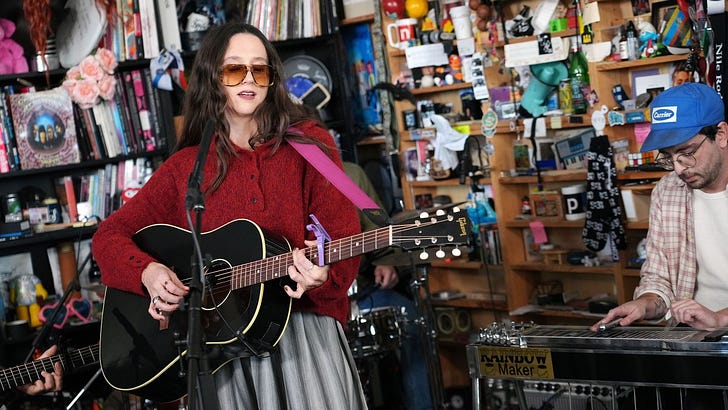"Southern" "rock." Sturgill Simpson. Karly Hartzman. MJ Lenderman. Waxahatchee.
Year-end thoughts on a sub-genre. Sturgill on toxic patriarchal energy and "Purple Rain." Katie Crutchfield's victory lap. Karly Hartzman solo.
Yes: I do indeed have a Best Music of 2024 list coming soon. The year ain’t over yet! (I mean hey, just look! — a (sorta) new Aphex Twin record.)
In other news, I wrote a year-end essay for Rolling Stone that posted this week. It’s about southern rock, the sub-genre and the notion. As I wrote:
[The] story of rock in 2024 is largely a story of Southern rock, in both classic-rock and indie-rock denominations.
On two of the year’s best records, Tigers Blood and Manning Fireworks, Katie “Waxahatchee” Crutchfield (Alabama) and Jake “MJ” Lenderman (North Carolina), respectively, made 21st-century rock music with distinctly Southern sensibilities. So did genre-dodging Prince fans Brittany Howard (Alabama) and Sturgill Simpson (Kentucky). Rosali Middleman (North Carolina), Margo Price (Illinois > Tennessee), Billy Strings (Michigan > Kentucky > Tennessee), and Hurray for the Riff Raff (New York City > New Orleans) — not to mention Willie Nelson, Bruce Springsteen BFF Zach Bryan, and any number of nominally “country” artists — also furthered the argument that top-tier rock and rock-adjacent music is growing like old-school weed below the Mason-Dixon. Southern rock even got play on the political stage in 2024, by turns thrillingly and appallingly.
Yes, I know — “Southern rock” is a triggering, problematic term for a number of reasons. To continue:
As a subgenre/marketing category, “Southern rock” was always an unstable and slightly absurd designation, since rock and roll is Southern music: Ask Little Richard (Georgia), Sister Rosetta Tharpe (Arkansas), Tina Turner (Tennessee), Elvis Presley (Mississippi), and Chuck Berry (Missouri, for the sake of argument). Rock & roll migrated up north and out West. It morphed, racially and stylistically; scenes rose and fell. For a hot minute in the Seventies, discerning rock fans coast to coast shelved “Southern rock” classics by the Allman Brothers Band, the Marshall Tucker Band, the Charlie Daniels Band, the Outlaws, and Lynyrd Skynyrd alongside LPs by Grateful Dead, the Eagles, Poco, Neil Young, the Flying Burrito Brothers, and The Band, not to mention “country soul” records by Arthur Alexander, Swamp Dogg, and Tony Joe White, and “outlaw country” records by Willie, Waylon, and Jessi. All these records drew from the same well, distilling sounds and mythology of the South into music that was simply, at the end of the day, American music.
“Country-rock,” “country-soul,” “outlaw country,” “Americana,” “indie rock,” “southern indie,” “southern rock” — they’re all dubious and unstable designators if you interrogate ‘em for two minutes. But we live in a world of labels, and all these terms carry historical connotations that can be burdensome if not exclusionary when it comes to marketing, Grammy-gaming, etc. (check Katie Crutchfield’s interview in a recent post on the great Don’t Rock The Inbox Substack, which addresses this point).
Yet those same connotations, good and bad, also present possibilities. What appeals to me most about Tigers Blood and Manning Fireworks — not to mention records by Brittany Howard, Sturgill Simpson, Alynda Segarra of Hurray For The Riff Raff (see her well-named Substack Resist Psychic Death) and particularly Beyoncé’s Cowboy Carter, is how they all played, quite fruitfully, with preconceived notions of what defines “country” or “southern” music. All made my best-of 2024 LP list. They all worked the borderlands of genre, mapping their own territory lit with the frisson of historically-freighted gestures, making new meaning on old turf — where the most interesting music happens, imho. All art, for that matter.
BTW, thanks to Bob Beatty for shouting out the piece in his Long Live the ABB Substack, which I highly recommend. Bob’s been thinking hard about Southern rock for a very long time.
Below, some tasty video clips, and some streaming playlists for paid subscribers, all of which should shine more light on these questions, while also
Keep reading with a 7-day free trial
Subscribe to Will Hermes: New Music + Old Music to keep reading this post and get 7 days of free access to the full post archives.




